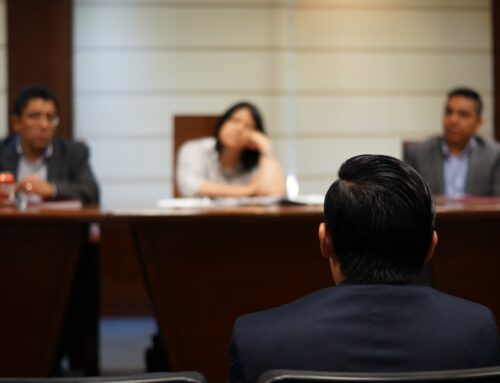Understanding the USCIS Interview Process
The USCIS interview process is a crucial step in your journey towards citizenship or adjustment of status. First, familiarize yourself with the purpose of the interview. In general, the USCIS officer will ask you questions about your application, background, and assess if you meet the eligibility criteria. Studying the requirements beforehand can help you navigate this process with confidence.
When preparing for your USCIS interview, it is essential to know what to expect. For instance, a naturalization interview focuses on your understanding of the U.S. history, government, and your ability to speak and write in English. In contrast, an adjustment of status interview mostly involves questions about your relationship with your U.S. citizen or lawful permanent resident spouse, as well as verifying the information in your application.
As you approach your appointment date, gather all necessary documents to bring to the interview. Typically, this includes your appointment notice, identification, and original copies of your application and supporting documents. If applicable, also bring certified translations of foreign language documents. Double-check that you have all the required materials to avoid any delays in the application process.
Make sure to review the USCIS requirements so there are no surprises during the interview. You can practice answering common interview questions to boost your confidence. Additionally, remember that honesty is crucial; always be truthful when answering the USCIS officer’s questions. If you’re unsure of an answer, do not hesitate to ask for clarification or say that you don’t know.
Lastly, consider the possibility of follow-up appointments or requests for additional documentation. USCIS may schedule another interview or require further evidence before making a decision on your case. By knowing what to expect and being well-prepared, you can confidently navigate the USCIS interview process and move closer towards achieving your immigration goals.

Basic Eligibility and Filing Requirements
Before starting your journey towards U.S. citizenship, it is important to determine if you meet the basic eligibility criteria. First, you must have a U.S. green card (lawful permanent residence) before you can apply for naturalized citizenship. Next, review the eligibility requirements for U.S. immigration carefully to ensure you meet all the conditions.
Once you have established your eligibility, you will need to file the appropriate forms with the United States Citizenship and Immigration Services (USCIS). For those seeking naturalization, the primary form is N-400, Application for Naturalization. Alternatively, if you are adjusting your immigration status from a non-immigrant to a permanent resident, you will need to file Form I-485, Application to Register Permanent Residence or Adjust Status.
When preparing your application, be sure to complete each form accurately, following the detailed instructions provided. It is essential to submit the required documents, such as proof of eligibility, along with your application. In addition, you may need to submit photographs that conform to the specifications outlined in the form instructions.
Filing fees and mailing addresses vary depending on the form you are submitting and the reason for your submission. Ensure that you pay the correct fees and send your application to the appropriate address to prevent any delays in processing. If you are unsure about any aspect of the filing process, consulting the USCIS Form Filing Tips can help clarify the procedure.
In summary, to successfully prepare for your USCIS interview, establish your eligibility, file the correct forms with the necessary supporting documents, and follow the provided filing guidance. This will expedite the process and set you on the path towards achieving your U.S. citizenship.

Key Documents and Information to Review
Before your USCIS interview, it’s essential to read thoroughly and review important documents related to your application. Preparing in advance can help ensure a smoother interview process. In this section, we will discuss some key documents and information you should focus on.
First, review your entire naturalization application (Form N-400) and any supporting documents you submitted. Your USCIS officer will ask questions about your application and background during the interview. Make sure you’re familiar with the information you provided and be ready to answer any questions.
Next, ensure you have your passport and any other relevant identification documents with you. Your passport will be used to verify your identity and travel history. In addition to your passport, bring your appointment notice, which indicates the date, time, and location of your USCIS interview.
It’s also crucial to review the history and civics portion of the naturalization test. This test consists of both English and civics components. During the English test, you will need to demonstrate your understanding of the English language. The civics test will assess your knowledge of U.S. history and government.
Lastly, gather all supporting documents required for the interview. These documents may include, but are not limited to, employment records, tax documents, and proof of residency. Having these documents organized and readily available will help streamline the interview process.
By reviewing these key documents and information, you will be more confident and better prepared for your USCIS interview. Remember to remain patient, honest, and clear during the meeting, and good luck on your path to citizenship.

Preparing for the Naturalization Test
Preparing for your USCIS interview and the naturalization test requires diligence and an understanding of the specific areas that will be covered. The naturalization test consists of two parts: the English test and the civics test.
For the English test, you will need to demonstrate your ability to read, write, and speak basic English. This test covers your understanding of the English language, including vocabulary and grammar. To enhance your English skills, make sure to practice reading, writing, and conversational exercises on a regular basis.
The civics test focuses on American government, history, and the principles of the U.S. Constitution. You will be asked a total of 20 questions, but only need to answer 12 correctly to pass the 2020 version of the test. However, it’s important to note that the 2008 version required only 6 correct answers out of 10 questions. To prepare for this portion of the test, familiarize yourself with the 128 civics test questions provided by USCIS.
In addition to practicing with the available questions, access a variety of study materials to adequately prepare yourself. These resources include flashcards, pocket study guides, videos, and interactive practice tests. Utilizing these materials will help build your knowledge and confidence in both the English and civics test sections.
During the actual interview, you will meet with a USCIS officer who will ask questions about your application and background. Be prepared to engage in conversation and confidently answer any inquiries the officer may have. Also, take the opportunity to address any concerns about the immigration process you may have, as the officer can provide helpful information and guidance.
In summary, focus on enhancing your English language skills and expanding your knowledge of American government, history, and the principles of the U.S. Constitution. Utilize available resources such as study materials and practice tests to solidify your understanding and give yourself the best chance of acing the naturalization test.

Addressing Immigration Issues and Legal Concerns
Navigating the green card application process can be daunting. To prepare for your USCIS interview, you should address any immigration issues and legal concerns beforehand. Here are some tips:
First, evaluate any criminal or immigration issues that might cause complications in your case. For instance, if you have a criminal record or past immigration violations, it’s important to identify and consider how these issues will impact your application. If necessary, consult with an experienced immigration attorney to help you evaluate and address any potential problems.
Second, ensure that your marriage-based green card application is genuine and not a sham. You and your spouse should present relevant documentation, such as photographs, correspondence, and joint financial records that show a legitimate relationship. Being prepared with evidence of your authentic relationship will help eliminate any doubts about the validity of your marriage during the interview process.
Third, do your homework on the details of your case. Familiarize yourself with the forms you’ve submitted, your family’s background, your employment history, and other important facts the interviewing officer may ask about during the interview. A thorough understanding of your case will not only help you answer questions confidently but also demonstrate your commitment to the green card process.
Fourth, consider hiring a lawyer to help you navigate the process, especially if your case is particularly complex or has potential legal issues. An experienced immigration attorney will be able to advise you on any necessary actions, such as obtaining waivers for crimes or addressing past immigration violations.
Lastly, practice answering common USCIS interview questions with your spouse or lawyer in order to build your confidence and ensure you’re prepared for the actual interview. Make sure you understand the purpose of the questions being asked and provide honest and accurate answers. Remember, the USCIS officer conducting the interview is there to determine your eligibility for a green card, so being well-prepared will greatly contribute to a positive interview experience.
Frequently Asked Questions
What are some common questions asked at a USCIS interview?
During your USCIS interview, some common questions may include your personal information, marital status, and other background information. You will also be asked questions related to your temporary work visa if applicable. It is important to be clear and accurate when answering these questions.
How can I best prepare for my immigration interview?
To prepare for your immigration interview, make sure you are well-versed in your application details and be ready to provide accurate answers about your background. It is also important to review any documents you submitted with your application, as the officer may have questions related to them.
What documents should I bring to my green card interview?
Ensure you bring all relevant documents, including identification documents, proof of your legal entry into the U.S., and any other paperwork related to your case. Bringing a complete set of documents can help ensure a smooth interview process.
How can I make a good impression during the USCIS interview?
To make a good impression during the USCIS interview, dress professionally, be punctual, and maintain a calm demeanor. Show respect to the officer and provide clear and concise answers to their questions. Do not be afraid to ask for clarification if needed.
What are some red flags to avoid in an immigration interview?
Avoid providing unclear or inconsistent answers as they may raise suspicion. It is essential to be honest and transparent during the interview, as dishonesty can lead to delays or denial of your application. You should also be cautious not to interrupt the officer while they are speaking, as it may come across as disrespectful.
What is the appropriate attire for a USCIS interview?
Dress in a professional manner for your USCIS interview by wearing clean, well-fitting clothing. Business attire is recommended, as it signals your respect for the process and conveys seriousness about your application.




